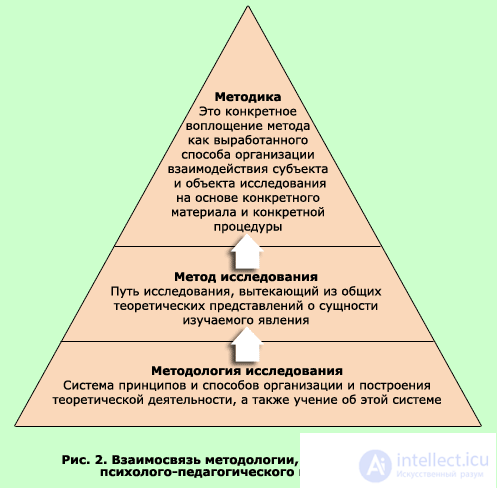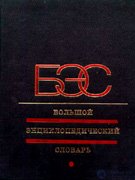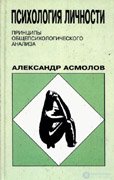Lecture
In pedagogical psychology, all those methods are used that are in general, age and many other branches of psychology: observation, oral and written questioning, the method of analyzing activity products, content analysis, experiment , etc., but only here they are applied taking into account the age of children and those psychological and pedagogical problems in the context of which there is a need to address them (see Fig. 1). Changes made to these methods, when they are used in educational psychology, relate to the possibility of assessing with their help the present level of education and training of the child or the changes that occur in his psyche and behavior under the influence of training and education. To determine the specificity of the application of general scientific research methods in educational psychology, it is necessary to consider some features of the relationship of methodology, methods and techniques of psychological and educational research, as well as levels of methodological knowledge. .
Each science, including pedagogical psychology, in order to develop productively, must be based on certain initial positions that give the correct ideas about the phenomena that it studies. In the role of such provisions are the methodology and theory .
The activity of people in any form (scientific, practical, etc.) is determined by a number of factors. Its final result depends not only on who acts (the subject) or on what it is directed (the object), but also on how this process is accomplished, what methods, techniques, means are used. This is the problem of the method.
The history and current state of knowledge and practice convincingly show that not every method , not any system of principles and other means of activity provides a successful solution of theoretical and practical problems. Not only the result of the study, but also the path leading to it must be true (see Fig. 2).

Methodology - a system of principles and methods of organization, the construction of theoretical and practical activities, as well as the teaching about this system .
The concept of "methodology" has two basic meanings: a) a system of certain methods and techniques used in a particular field of activity (in science, politics, art, etc.); b) the theory of this system, the general theory of the method, the theory in action .
In the first place, theory is a combination of views, judgments, and conclusions, which are the result of cognition and understanding of the phenomena and processes of objective reality .
 A particular scientific approach and methodological principles are implemented in specific research methods. In general science , the method (from the Greek. Methodos - the path of research, theory, teaching) - "a way to achieve any goal, solving a specific task; a set of techniques or operations of practical and theoretical development (cognition) of reality " (Great Encyclopedic Dictionary, 1998 . P. 724; abstract).
A particular scientific approach and methodological principles are implemented in specific research methods. In general science , the method (from the Greek. Methodos - the path of research, theory, teaching) - "a way to achieve any goal, solving a specific task; a set of techniques or operations of practical and theoretical development (cognition) of reality " (Great Encyclopedic Dictionary, 1998 . P. 724; abstract).
The main function of the method is the internal organization and regulation of the process of knowledge and practical transformation of a particular object. Therefore, the method (in one form or another) is reduced to a set of specific rules, techniques, methods, norms of knowledge and action. It is a system of prescriptions, principles, requirements, which should guide in solving a specific task, achieving a certain result in a particular field of activity. He disciplines the search for truth, allows (if it is correct) to save time and energy, move to the goal the shortest way. The true method serves as a kind of compass, by which the subject of knowledge and action makes its way, avoids mistakes.
In turn, the methods of educational psychology is specified in research methods. The technique meets the specific goals and objectives of psychological and pedagogical research, contains a description of the object and the study procedures, methods of fixing and processing the data obtained . Based on a particular method, many techniques can be created. For example, the experimental method in educational psychology is embodied in the methods of studying the intellect, will, personality of the student and other aspects of mental reality.
Example. Consider the "triangle" of the relationship of methodology, methods and techniques of psychological and pedagogical research on the example of Russian psychology and humanistic psychology.
In the Soviet period, the development of national pedagogical psychology , as well as psychology as a whole, was due to the prevalence of the dialectical materialist approach to understanding the essence of the phenomena of reality.
Consequently, one of the most important research methods in the field of psychology, in particular educational psychology, was the method of experiment. Using this method, causal hypotheses are verified, i.e. cause and effect. At that time, such a type of experiment as a formative experiment gained particular popularity. Therefore, various programs of the formative experiment , correctional developmental training programs, etc. were actively developed. (see Cross. 2.1).
The basis of humanistic psychology (C. Rogers, A. Maslow, and others) is the humanitarian paradigm . This paradigm in science presupposes the knowledge of nature, of society, of man himself from an anthropological, humanistic position; it brings the "human dimension" into all spheres of public life. It is characterized by the use of general principles in the interpretation of individual, social or historical events. But at the same time, a single case is not considered as a particular case of a general pattern, but is taken in its own value and autonomy. For humanitarian knowledge it is important to comprehend isolated facts as such. Therefore, one of the main ways of knowing man and his "second nature" is understanding. Understanding is not only knowledge, but also complicity, empathy, empathy for another . Therefore, among the main methods of knowledge, methods of practical psychology prevail (psychological counseling, psychotherapy, psycho-training, transactional analysis, etc.).
 In modern methodology and logic of science (Asmolov AG, 1996, abstract) the following general scheme of methodology levels is highlighted:
In modern methodology and logic of science (Asmolov AG, 1996, abstract) the following general scheme of methodology levels is highlighted:
Philosophical methodology is the basis on which research activity is based. In the role of the methodological basis of specific scientific areas are major philosophies. It does not exist as a system of strict norms or indications of the need for uncertain techniques, but only offers basic guidelines. At this level of methodology is the consideration of general forms of scientific thinking.
The general scientific methodology includes attempts to develop universal principles, tools and forms of scientific knowledge, correlated, at least potentially, not with any particular science, but applicable to a wide range of sciences. However, this level of methodology remains nevertheless, in contrast to the philosophical methodology, within the framework of scientific knowledge proper, without expanding to the world outlook level.
These include, for example, the concepts of systems scientific analysis, the structural-level approach, the cybernetic principles of describing complex systems, etc. At this level, the general problems of building scientific research, the ways to carry out theoretical and empirical activities are developed, in particular, the general problems of experimenting, observing and modeling
Specific scientific methodology develops the same problems as the general scientific methodology, but within the framework of specific sciences, based on the characteristics of the object of science, in relation to both theory and empirical activity.
This is carried out within the framework of knowledge systems created by scientific schools, which differ from each other in their explanatory principles and methods of research and practical work
At the level of specific methods and research techniques , the development of specific methods of psychological and pedagogical research in relation to the solution of cognitive tasks of a particular type is carried out. At this level, the problems of validity and methods of the developed diagnostic research methods are considered
 One of the most recognized and well-known classifications of methods of psychological and pedagogical research is the classification proposed by B.G. Anan'ev (Anan'ev, BG, 2001; abstract) (see Fig. 4).
One of the most recognized and well-known classifications of methods of psychological and pedagogical research is the classification proposed by B.G. Anan'ev (Anan'ev, BG, 2001; abstract) (see Fig. 4).

 Ananiev described in detail each of the methods, but with all the thoroughness of his argumentation, as noted by V.N. Druzhinin in his book "Experimental Psychology" (Druzhinin VN, 1997; abstract), many unsolved problems remain: why modeling turned out to be an empirical method? How do practical methods differ from field experiment and instrumental observation? Why is the group of interpretation methods separated from organizational ones?
Ananiev described in detail each of the methods, but with all the thoroughness of his argumentation, as noted by V.N. Druzhinin in his book "Experimental Psychology" (Druzhinin VN, 1997; abstract), many unsolved problems remain: why modeling turned out to be an empirical method? How do practical methods differ from field experiment and instrumental observation? Why is the group of interpretation methods separated from organizational ones?
The result of the application of empirical methods is the data that fixes the state of the object indications of devices; reflecting the results of activities, etc.
The result of the application of theoretical methods is represented by knowledge of the subject in the form of a natural language, sign-symbolic, or spatial-schematic.
Finally, interpretation-descriptive methods are the “meeting place” of the results of applying theoretical and experimental methods and the place of their interaction. The data of empirical research, on the one hand, are subjected to primary processing and presentation in accordance with the requirements for the results from the organizers of the study of the theory, model, inductive hypothesis; on the other hand, these data are interpreted in terms of competing concepts for the hypotheses to match the results.
The result of interpretation is fact, empirical dependence and ultimately justification or rejection of the hypothesis .
 Observation is the most widely used empirical method of studying a person in educational psychology (and in teaching practice as a whole). Observation is understood as a purposeful, organized and definitely fixed perception of the object under study . The results of recording the observation data are called a description of the behavior of the object.
Observation is the most widely used empirical method of studying a person in educational psychology (and in teaching practice as a whole). Observation is understood as a purposeful, organized and definitely fixed perception of the object under study . The results of recording the observation data are called a description of the behavior of the object.
Observation can be carried out directly or with the use of technical means and methods of data recording (photo, audio and video equipment, observation cards, etc.). However, with the help of observation, it is possible to detect only phenomena that occur in ordinary, “normal” conditions, and in order to know the essential properties of an object, it is necessary to create special conditions that are different from “normal”.
There are several types of observations (see Fig. 6).
Depending on the position of the observer, open and hidden observation is distinguished. The first means that the subjects know the fact of their scientific control, and the activity of the researcher is perceived visually. Hidden surveillance implies the fact of hidden tracking of the actions of the subject. The difference between the first and second is in comparing data on the course of psychological and pedagogical processes and the behavior of participants in the educational interaction in terms of a sense of supervision and freedom from prying eyes.
There are, further, complete and selective observation. The first covers processes in a holistic form: from their beginning to the end, to completion. The second is a dotted, selective fixation of certain studied phenomena and processes. For example, when studying the laboriousness of teacher and student work in a lesson, the whole training cycle is observed from its start at the beginning of the lesson to the end of the lesson. А при изучении неврогенных ситуаций в отношениях учитель-ученик исследователь как бы выжидает, наблюдая со стороны за этими событиями, чтобы затем подробно описать причины их возникновения, поведение обеих конфликтующих сторон, т.е. учителя и ученика.
Результат исследования, в котором используется метод наблюдения, в значительной степени зависит от самого исследователя, от его "культуры наблюдения". Необходимо учитывать специфические требования к процедуре получения и трактовки информации в наблюдении. Среди них особо выделяются следующие:
1. Наблюдению доступны только внешние факты, имеющие речевые и двигательные проявления. Наблюдать можно не интеллект, а то, как человек решает задачи; не общительность, а характер взаимодействия с другими людьми и т.д.
2. It is necessary that the observed phenomenon, the behavior be determined operationally, in terms of real behavior, i.e. Recorded characteristics should be as descriptive as possible and as less explanatory as possible.
3. For observation, the most important moments of behavior (critical cases) should be highlighted.
4. The observer should be able to record the behavior of the evaluated person for a long period of time, in many roles and critical situations.
5. Reliability of observation increases in case of coincidence of the testimony of several observers.
6. Ролевые отношения между наблюдателем и наблюдаемыми должны быть устранены. Например, поведение ученика будет различным в присутствии родителей, учителя и сверстников. Поэтому и внешние оценки, даваемые одному и тому же лицу по одному и тому же набору качеств людьми, занимающими разное положение по отношению к нему, могут оказаться разными.
7. Оценки в наблюдении не должны быть подвержены субъективным влияниям (симпатиям и антипатиям, переносам отношения с родителей на ученика, с успеваемости ученика на его поведение, и т.п.).
Беседа - широко распространенный в педагогической психологии эмпирический методobtaining information (information) about the student in communication with him, as a result of his answers to focused questions. This is a student’s behavior research method specific to educational psychology. The dialogue between two people, during which one person reveals the psychological characteristics of another, is called the method of conversation . Psychologists of various schools and directions widely use it in their research. It is enough to name Piaget and representatives of his school, humanistic psychologists, founders and followers of "deep" psychology, etc.
In conversations , диалогах, дискуссиях выявляются отношения учащихся, учителей, их чувства и намерения, оценки и позиции. Исследователи всех времен в беседах получали такую информацию, какую никакими другими способами получить невозможно.
Психолого-педагогическая беседа как метод исследования отличается целенаправленными попытками исследователя проникнуть во внутренний мир субъектов учебного процесса, выявить причины тех или иных поступков. Информацию о нравственных, мировоззренческих, политических и других взглядах испытуемых, их отношении к интересующим исследователя проблемам также получают с помощью бесед. Но беседы - очень сложный и не всегда надежный метод. Поэтому он применяется чаще всего как дополнительный - для получения необходимых разъяснений и уточнений по поводу того, что не было достаточно ясным при наблюдении или использовании иных методов.
Беседа включается как дополнительный метод в структуру психолого-педагогического эксперимента на первом этапе, когда исследователь собирает первичную информацию об ученике, учителе, дает им инструкцию, мотивирует и т.д., и на последнем этапе - в форме постэкспериментального интервью.
Интервью называют целенаправленным опросом. Интервью определяется как "псевдобеседа": интервьюер все время должен помнить, что он - исследователь, не упускать из внимания план и вести разговор в нужном ему русле.
 Анкетирование- an empirical socio-psychological method of obtaining information on the basis of answers to specially prepared, corresponding to the main task of the research questions that make up the questionnaire. Questioning is a method of mass collection of material using specially designed questionnaires, called questionnaires. Questioning is based on the assumption that a person frankly answers the questions asked to him. However, as shown by recent studies of the effectiveness of this method, these expectations are met by about half. This circumstance sharply narrows the range of application of the questionnaire and undermines confidence in the objectivity of the results obtained (Yadov V.A., 1995; abstract).
Анкетирование- an empirical socio-psychological method of obtaining information on the basis of answers to specially prepared, corresponding to the main task of the research questions that make up the questionnaire. Questioning is a method of mass collection of material using specially designed questionnaires, called questionnaires. Questioning is based on the assumption that a person frankly answers the questions asked to him. However, as shown by recent studies of the effectiveness of this method, these expectations are met by about half. This circumstance sharply narrows the range of application of the questionnaire and undermines confidence in the objectivity of the results obtained (Yadov V.A., 1995; abstract).
Педагогов и психологов анкетирование привлекло возможностью быстрых массовых опросов учеников, учителей, родителей, дешевизной методики и возможностью автоматизированной обработки собранного материала.
Анкетирование может быть устным, письменным, индивидуальным, групповым, но в любом случае должно отвечать двум требованиям - репрезентативности и однородности выборки. Материал анкетирования подвергается количественной и качественной обработке.
Метод тестирования. В связи со спецификой предмета педагогической психологии одни из названных выше методов используются в ней в большей степени, другие - в меньшей. Однако все большее распространение в педагогической психологии получает метод тестирования.
Тест (англ. test - проба, испытание, проверка) - в психологии - фиксированное во времени испытание, предназначенное для установления количественных (и качественных) индивидуально-психологических различий (Бурлачук, 2000. С. 325). Тест - основной инструмент психодиагностического обследования, с помощью которого осуществляется психологический диагноз.
 Testing is far from new, but the method of research that is not enough used in educational psychology (Burlachuk, 2000, p. 325; abstract). Back in the 80-90s. XIX century. researchers began to study individual differences of people. This led to the emergence of the so-called test experiment - studies using tests (A. Dalton, A. Cattel, etc.). The use of tests was the impetus for the development of the psychometric method , the foundations of which were laid by B. Henri and A. Binet. Measuring school success, intellectual development, the degree of formation of many other qualities with the help of tests has become an integral part of a wide educational practice. Psychology, having provided pedagogy with an analysis tool, closely connected with it (it is sometimes impossible to separate pedagogical testing from psychological testing)
Testing is far from new, but the method of research that is not enough used in educational psychology (Burlachuk, 2000, p. 325; abstract). Back in the 80-90s. XIX century. researchers began to study individual differences of people. This led to the emergence of the so-called test experiment - studies using tests (A. Dalton, A. Cattel, etc.). The use of tests was the impetus for the development of the psychometric method , the foundations of which were laid by B. Henri and A. Binet. Measuring school success, intellectual development, the degree of formation of many other qualities with the help of tests has become an integral part of a wide educational practice. Psychology, having provided pedagogy with an analysis tool, closely connected with it (it is sometimes impossible to separate pedagogical testing from psychological testing)
If we talk about purely pedagogical aspects of testing, let us point out, first of all, the use of performance tests. Tests of skills, such as reading, writing, simple arithmetic operations, as well as various tests to diagnose the level of learning - identifying the degree of mastering of knowledge and skills in all academic subjects are widely used.
Usually, testing as a method of psychological and pedagogical research is merged with practical testing of current performance, identification of the level of training, quality control of learning material.
The most complete and systematic description of tests is presented in the work of A. Anastasi "Psychological Testing". Analyzing testing in education, the scientist notes that in this process all types of existing tests are used, but among all types of standardized tests, achievement tests numerically outperform all others. They were created to measure the objectivity of programs and learning processes. Usually they "give a final assessment of an individual's achievements upon completion of training, in them the main interest is focused on what an individual can do by now" ( Anastasi A., 1982. P. 36-37 ).
All the above means that the use of testing in educational psychology requires special training, high qualification and responsibility.
The experiment is one of the main (along with observation) methods of scientific knowledge in general, psychological research in particular. It differs from observation by active intervention into the situation from the side of a researcher who systematically manipulates one or several variables (factors) and records associated changes in the behavior of the object being studied (see Fig. 7).
Correctly set experiment allows to test hypotheses in cause-effect causal relations, without being limited to the statement of connection ( correlation ) between variables. There are traditional and factorial plans for the experimen
With traditional planning, only one independent variable changes, with a factorial variable , several. The advantage of the latter is the ability to assess the interaction of factors - changes in the nature of the influence of one of the variables depending on the value of the other. For statistical processing of the experimental results in this case, analysis of variance is used (R. Fisher). If the studied area is relatively unknown and there is no system of hypotheses, then they talk about a pilot experiment, the results of which can help clarify the direction of further analysis. When there are two competing hypotheses and the experiment allows you to choose one of them, they talk about the decisive experiment. The control experiment is carried out to verify any dependencies. The application of the experiment, however, faces fundamental limitations due to the inability in some cases to carry out an arbitrary change of variables. Thus, in differential psychology and personality psychology, empirical dependencies mostly have a status of correlations (ie, probabilistic and statistical dependencies) and, as a rule, do not always allow conclusions to be drawn about cause-effect relationships. One of the difficulties of applying an experiment in psychology is that the researcher is often involved in the situation of communication with the subject (the subject) and may unwittingly influence his behavior (Fig. 8). Forming, or teaching, experiments form a special category of methods of psychological research and impact. They allow you to directionally form the features of such mental processes as perception, attention, memory, thinking.

The experiment procedure consists in directional creation or selection of such conditions that ensure reliable selection of the studied factor, and in registration of changes associated with its effect.
Most often, psychological and pedagogical experiments deal with 2 groups: experimental, which includes the factor under study, and the control group, in which it is absent.
The experimenter, at his discretion, may modify the conditions of the experiment and observe the consequences of such a change. This, in particular, makes it possible to find the most rational methods in educational work with students. For example, by changing the conditions for memorizing a particular educational material, it can be established under what conditions memorization will be the fastest, strongest, and most accurate. Conducting research under the same conditions with different subjects, the experimenter can determine the age and individual characteristics of the course of mental processes in each of them.
According to the form of conducting there are two main types of experiment - laboratory and natural.
A laboratory experiment is conducted in specially organized artificial conditions designed to ensure the purity of the results. To this end, the side effects of all simultaneously occurring processes are eliminated. A laboratory experiment makes it possible, using recording instruments, to accurately measure the time taken for mental processes, for example, the speed of a person’s reaction, the speed at which training and work skills are formed. It is used in cases where it is necessary to obtain accurate and reliable performance under strictly defined conditions. A more limited use is of a laboratory experiment in the study of manifestations of personality, character.  On the one hand, the object of study is complex and multifaceted, on the other hand, the well-known artificiality of the laboratory situation presents great difficulties. Investigating the manifestations of personality in artificially created special conditions, in a particular, limited situation, we do not always have reason to conclude that similar manifestations will be characteristic of the same personality in natural life circumstances. The artificiality of the experimental environment is a significant disadvantage of this method. It may entail a violation of the natural course of the studied processes. For example, remembering an important and interesting educational material, under natural conditions a student achieves different results than when he is asked to remember experimental material in unusual conditions that is not directly interesting for the child. Therefore, a laboratory experiment should be carefully organized and, if possible, be combined with other, more natural techniques . Laboratory experiment data are mainly of theoretical value; conclusions drawn from them can be extended to real life practice with known limitations (Milgram Art. 2000; annotation).
On the one hand, the object of study is complex and multifaceted, on the other hand, the well-known artificiality of the laboratory situation presents great difficulties. Investigating the manifestations of personality in artificially created special conditions, in a particular, limited situation, we do not always have reason to conclude that similar manifestations will be characteristic of the same personality in natural life circumstances. The artificiality of the experimental environment is a significant disadvantage of this method. It may entail a violation of the natural course of the studied processes. For example, remembering an important and interesting educational material, under natural conditions a student achieves different results than when he is asked to remember experimental material in unusual conditions that is not directly interesting for the child. Therefore, a laboratory experiment should be carefully organized and, if possible, be combined with other, more natural techniques . Laboratory experiment data are mainly of theoretical value; conclusions drawn from them can be extended to real life practice with known limitations (Milgram Art. 2000; annotation).
Natural experiment . These drawbacks of a laboratory experiment are to some extent eliminated by organizing a natural experiment. For the first time this method was proposed in 1910. А.F. Lazursky at the 1st All-Russian Congress on Experimental Pedagogy. A natural experiment is conducted under normal conditions within the framework of an activity familiar to the subjects, for example, training sessions or games. Often the situation created by the experimenter may remain outside the consciousness of the subjects; in this case, a positive factor for research is the complete naturalness of their behavior. In other cases (for example, if the teaching methods, school equipment, day schedule, etc.) are changed, the experimental situation is created openly, so that the subjects themselves are made by the participants in its creation. Such research requires particularly careful planning and preparation. It makes sense to use it when data must be obtained in an extremely short time and without interference for the main activity of the subjects. A significant drawback of a natural experiment is the unavoidable presence of uncontrolled interference, i.e., factors whose influence has not been established and cannot be measured quantitatively.
 A.F. Lazursky expressed the essence of the natural experiment as follows: "In the course of a natural experimental study of personality, we do not use artificial methods, do not make experiments in artificial laboratory conditions, do not isolate a child from the usual environment of his life, but experiment with natural forms of the external environment. We explore personality by life itself therefore, all the influences of both the individual on the environment and the environment on the individual become available to the survey. Here the experiment enters into life. We do not examine individual psychos As it is usually done (for example, memory is explored by memorizing meaningless syllables, attention is struck out by striking out icons on tables), and we examine mental functions and the personality as a whole. At the same time, we use not school material ” Lazursky A.F., 1997; abstract).
A.F. Lazursky expressed the essence of the natural experiment as follows: "In the course of a natural experimental study of personality, we do not use artificial methods, do not make experiments in artificial laboratory conditions, do not isolate a child from the usual environment of his life, but experiment with natural forms of the external environment. We explore personality by life itself therefore, all the influences of both the individual on the environment and the environment on the individual become available to the survey. Here the experiment enters into life. We do not examine individual psychos As it is usually done (for example, memory is explored by memorizing meaningless syllables, attention is struck out by striking out icons on tables), and we examine mental functions and the personality as a whole. At the same time, we use not school material ” Lazursky A.F., 1997; abstract).
By the number of variables studied , one-dimensional and multi-dimensional experiments are distinguished.
One-dimensional experiment involves the selection in the study of one dependent and one independent variable. It is most often implemented in a laboratory experiment .
Multivariate experiment . In a natural experiment, the idea of studying phenomena is affirmed not in isolation, but in their interconnection and interdependence. Therefore, a multi-dimensional experiment is most often implemented here. It requires the simultaneous measurement of a number of accompanying features, the independence of which is unknown in advance. The analysis of the connections between the set of studied characteristics, the identification of the structure of these relations, its dynamics under the influence of training and education are the main goal of a multi-dimensional experiment.
The results of an experimental study often represent an unidentified pattern, a stable relationship, and a number of more or less fully documented empirical facts. Such are, for example, experimental descriptions of children's play activity, experimental data on the influence of such factors as the presence of other people and the associated motive of competition on any activity. These data, which are often descriptive in nature, do not yet reveal the psychological mechanism of the phenomena and represent only more specific material, narrowing the further scope of the search. Therefore, the results of the experiment in pedagogy and psychology should often be considered as an intermediate material and the initial basis for further research work
The formative experiment is a method used in age and pedagogical psychology to track changes in the psyche of a child during the active influence of a researcher on a subject.
Formative experiment is widely used in domestic psychology in the study of specific ways of shaping a child’s personality, providing a combination of psychological research with a pedagogical search and designing the most effective forms of the educational process (see Cross. 2.2)
History reference
An experimental genetic method for studying mental development was developed by LS. Vygotsky and is associated with his cultural-historical theory of the development of higher mental functions . For the first time L.S. Vygotsky and A.N. Leontiev in the study of the formation of higher mediated forms of attention and memory. The essence of the method lies in the development of artificial experimental conditions that contribute to the creation of the very process of the emergence of higher forms of mental functions. The basis of such an experimental study of the genesis of mental phenomena was two basic principles: first, specifically human mental processes are mediated processes that use various tools developed in the course of the historical development of human culture — signs, symbols, language, measures, etc. ; the second is that any mental process arises and functions in two planes - social and psychological, or, as L. S. Vygotsky, first as an interpsychic category, and then as intrapsychic. After the death of L.S. Vygotsky experimentally-genetic method for the study of mental development was successfully used by his staff and followers in numerous studies (when forming pitch hearing by A. N. Leontiev, in the study of voluntary movements by A. V. Zaporozhets, by studying the patterns of perception development by L. Wenger and others). A significant contribution was made by P.Ya. Halperin, who developed the theory and methodology of the gradual formation of mental actions , and then the purposeful formation of mental processes with predetermined properties (attention, simultaneous perception, etc.). L.S. Vygotsky warned against a simplified understanding of the facts obtained in such artificial conditions and the direct transfer of conclusions to the real process of development. In the 60s. in addition to research carried out in the laboratory, numerous studies have appeared in the form of experimental organization of the process of learning whole classes for analyzing the impact of training on mental development (P.Ya. Halperin, VV Davydov, D. B. Elkonin, etc.) . |
According to the objectives distinguish stating and forming experiments.
The goal of the stating experiment is to measure the present level of development (for example, the level of development of abstract thinking, moral-volitional personality traits, etc.). Thus, it turns out the primary material for the organization of the forming experiment .
The forming (transforming, teaching) experiment sets as its goal not a simple statement of the level of formation of one or another activity, development of one or another side of the psyche, but their active formation or upbringing. In this case, a special experimental situation is created, which allows not only to identify the conditions necessary for organizing the required behavior, but also to experimentally carry out a purposeful development of new types of activities, complex mental functions and to reveal their structure deeper. The basis of the formative experiment is an experimental-genetic method for studying mental development (see Fig. 9).
The theoretical basis of the formative experiment is the concept of the leading role of training and education in mental development.
Индивидуальный эксперимент позволяет не только констатировать уже сложившиеся особенности психических процессов у человека, но и целенаправленно формировать их, достигая определенного уровня и качества. Благодаря этому можно экспериментально изучать генезис восприятия, внимания, памяти, мышления и других психических процессов посредством учебного процесса. Теория психических способностей как прижизненно складывающихся функциональных систем мозга (А.Н. Леонтьев), теория поэтапного формирования умственных действий (П.Я. Гальперин) и ряд других теорий, созданных в отечественной психологии, опирались на данные, полученные в основном с помощью обучающих экспериментов.
Коллективное экспериментальное обучение проводится в масштабе целых групп детского сада, классов школы, студенческих групп и т. п. Организация таких исследований связана прежде всего с потребностями педагогики и психологии в углубленном изучении влияния обучения на психическое развитие человека, в частности в изучении возрастных возможностей развития психики человека при разных условиях его деятельности (исследования Л.В. Занкова, Г.С. Костюка, А.А. Люблинской, Б.И. Хачапуридзе, Д.Б. Эльконина и др.). Раньше эти проблемы разрабатывались на массовом материале применительно к системе условий, стихийно складывающихся и доминирующих в данных конкретно-исторических обстоятельствах. Получаемые при этом сведения об особенностях психического развития человека нередко абсолютизировались, а источники развития этого процесса порой усматривались лишь в более или менее постоянной психологической природе самого индивида. Основная задача экспериментального обучения состоит в существенном изменении и варьировании содержания и форм учебной деятельности человека с целью определения влияния этих изменений на темпы и особенности психического (в частности, умственного) развития, на темпы и особенности формирования его восприятия, внимания, памяти, мышления, воли и т.п. Благодаря этому можно исследовать внутренние связи, существующие между обучением и развитием, описывать разные типы этих связей, а также находить условия учебной деятельности, наиболее благоприятствующие психическому развитию в том или ином возрасте. В процессе экспериментального обучения можно сформировать, например, такой уровень интеллектуальной деятельности ребенка, который нельзя наблюдать у него при обычной системе преподавания.
Проведение экспериментального обучения в коллективах (группах, классах или их комплексах) обеспечивает регулярность, систематичность и преемственность необходимых обучающих воздействий, а также дает разнообразный массовый материал для дальнейшей статистической обработки. Собственно экспериментальное обучение должно удовлетворять некоторым специфическим требованиям, вытекающим из необходимости соблюдать основные жизненные интересы испытуемых. Эти исследования не должны вредить духовному и нравственному здоровью участвующих в них людей. В экспериментальных группах, классах и школах создаются и поддерживаются наиболее благоприятные условия для учебной деятельности.
В сочетании с индивидуальным обучающим экспериментом коллективное экспериментальное обучение все шире используется в психологии и дидактике как особый метод исследования сложных процессов психического развития человека.
продолжение следует...
Часть 1 2. METHODS OF PEDAGOGICAL PSYCHOLOGY
Часть 2 Glossary - 2. METHODS OF PEDAGOGICAL PSYCHOLOGY
Comments
To leave a comment
Pedagogical psychology
Terms: Pedagogical psychology